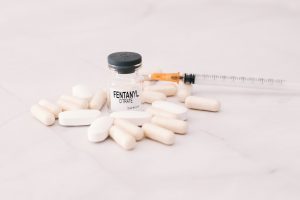
Fentanyl is a synthetic opioid often prescribed for patients with severe pain, such as following major surgery, or those with chronic pain for whom other opioids prove ineffective. It is similar to morphine, except that it can be up to 100 times more powerful. This potency means fentanyl can be highly addictive. In recent years, fentanyl has come to account for the majority of drug overdose deaths in the United States. If you or someone you love is struggling with opioid abuse, contact us now at [Direct] to learn about our opioid rehab programs.
Opioid Abuse
Opioids are a class of drugs that occur naturally in poppy plants. Many common opioids are directly derived from poppies. Fentanyl, on the other hand, is created in a lab using similar chemical structures to other opioids. Its synthetic construction means fentanyl is much stronger than other opioids and is more likely to lead to addiction.
Opioid abuse, in the case of fentanyl or other drugs, can occur when a person develops a tolerance, resulting in needing more of the drug to achieve the same effect. As tolerance increases, so too does the likelihood of experiencing negative side effects related to drug use.
Signs of Fentanyl Abuse
The signs of fentanyl abuse fall into two categories: psychological and physical impacts. Using large amounts of fentanyl, especially if it is abused for an extended period of time, changes a person’s brain chemistry and results in a variety of mental symptoms. These include:
- Paranoia
- Confusion
- Delusions
- Negative changes in personality
- Physical impacts of fentanyl abuse
Fentanyl abuse also changes your body in physical ways, many of which are related to digestion and your body’s neurological system. Common physical ailments that accompany fentanyl abuse include:
- Digestive issues, including constipation
- Breathing problems
- Problems walking
Beyond the signs of active fentanyl abuse, people who suddenly stop using fentanyl are at risk of severe withdrawal symptoms. These may involve aches and pain, tremors, insomnia, vomiting, and diarrhea.
Opioid Rehab Program
While it is rarely life-threatening to quit fentanyl cold turkey, the process may involve withdrawal symptoms and difficulty. Thus, for those dealing with fentanyl abuse, an opioid rehab program may offer the best path toward recovery. Entering an opioid rehab program and benefitting from its multifaceted support system may also be the best way to avoid relapse.
Opioid rehab programs often pair medications with counseling. Medications such as methadone act on the brain in similar ways to an opioid without being addictive, thereby decreasing dependence and reducing withdrawal symptoms. Addiction counseling, including behavioral therapy, works to modify mindsets and behaviors that influence drug use.
Counseling related to fentanyl abuse often involves a combination of:
- Cognitive-behavioral therapy, which works to alter a patient’s behavior while managing triggers and stressors that could otherwise derail addiction treatment;
- Contingency management, which emphasizes a reward system that allows patients to earn things that encourage a healthy lifestyle in return for clear drug tests; and
- Motivational interviewing, a type of patient-centered counseling that works through people’s resistance to change.
Recover from Opioid Abuse at Georgia Addiction Treatment Center
Georgia Addiction Treatment Center is here to support you or a loved one in recovering from opioid abuse. Our treatment professionals are available at all hours to ensure you are able to access the support you need. We customize our treatment programs to best heal not only your body but also your mind and spirit. Moreover, when appropriate, we seek to engage families in treatment plans out of a belief that recovery is not meant to happen in isolation.
We offer expert opioid abuse rehab programs in both inpatient and outpatient options tailored to what is best for each person. Learn more about how our opioid abuse rehab programs might benefit you by calling us at [Direct].





